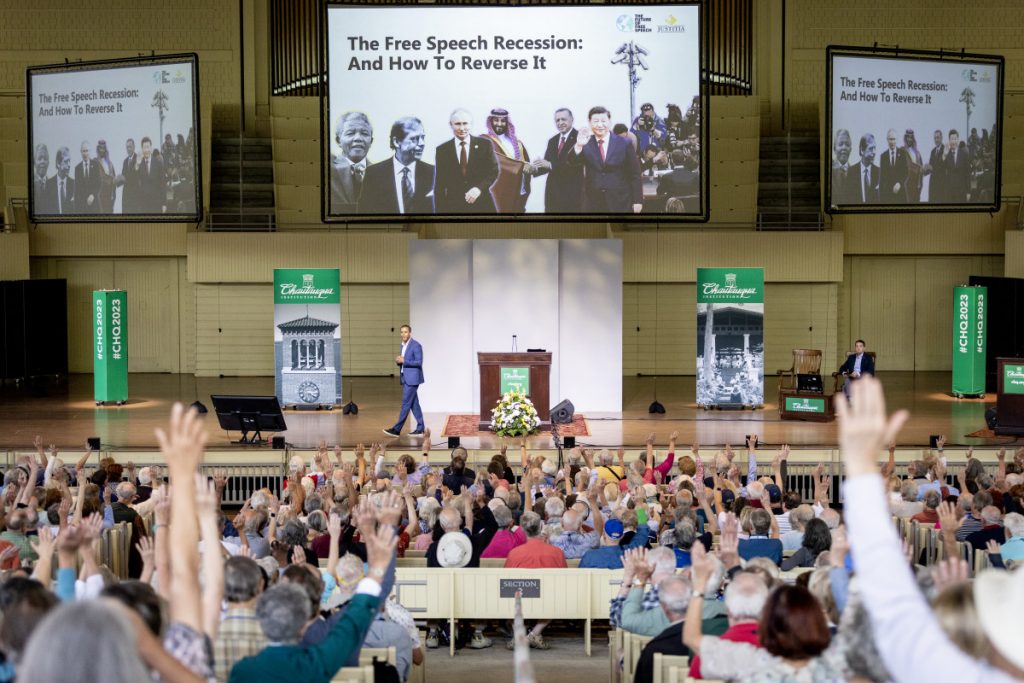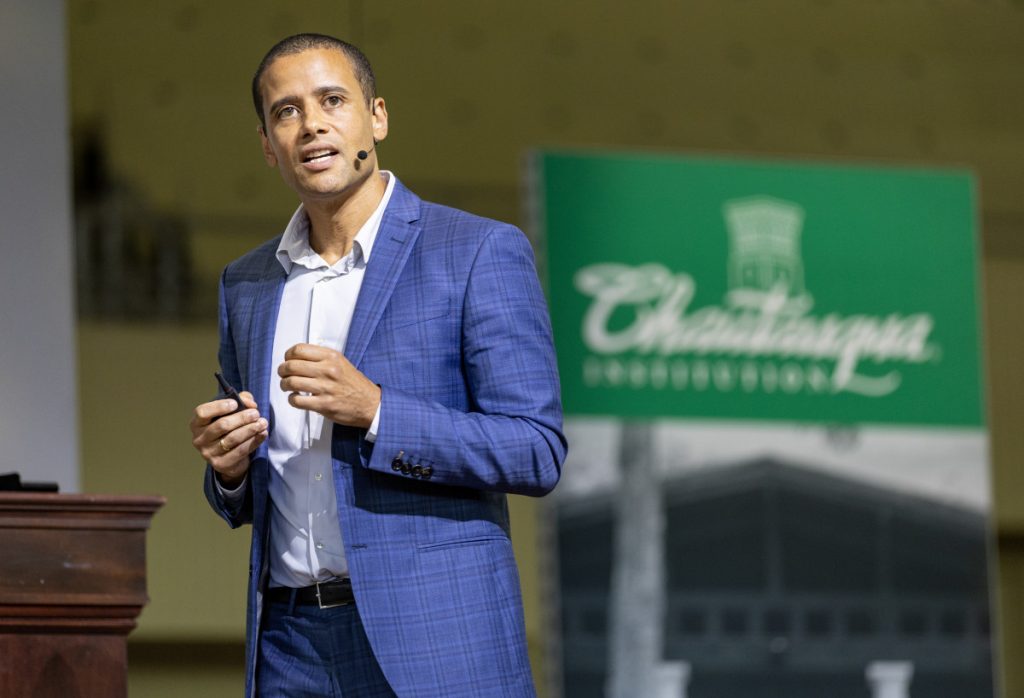
Alton Northup
Staff writer
The world has entered a free speech recession as censorship rises, said Jacob Mchangama.
“One of the concerning things of the current free speech recession is that democracies are contributing to it,” he said.
Mchangama, a lawyer and CEO of think tank Justitia, spoke on the history of free speech and why protecting it matters in his lecture, “The Free Speech Recession and How to Reverse It,” at 10:45 a.m. Monday in the Amphitheater to open the Chautauqua Lecture Series Week Eight theme, “Freedom of Expression, Imagination, and the Resilience of Democracy.”
In 2005, the Danish newspaper Jyllands-Posten drew global controversy after publishing a dozen editorial cartoons, mostly depicting Muhammed, founder and major prophet of Islam who many consider it blasphemy to visually depict. Despite protests from Islamic leaders in the country, lawsuits, requests to meet with diplomatic representatives from Muslim-majority countries, and multiple terrorist attacks, the Danish government refused to intervene in the publisher’s speech.
Former Danish Prime Minister Anders Fogh Rasmussen described the events as “Denmark’s worst international relations incident since the Second World War” in an interview with Big Think.
However, the country’s support for free speech seems to have waned, Mchangama said. After months of far-right activist-led Quran burnings in the country earlier this year, Danish Foreign Minister Lars Løkke Rasmussen, of no relation to Fogh Rasmussen, announced on July 30 that the government will “explore the possibility of intervening in special situations where, for instance, other countries, cultures, and religions are being insulted, and where this could have significant negative consequences for Denmark.”
The move came after 15 countries condemned Denmark, resulting in the summons of ambassadors and a meeting of the Organization of Islamic Cooperation, according to a press release from the Danish Ministry of Foreign Affairs.
Denmark is not the only Western nation that Mchangama diagnosed with what he calls “Milton’s Curse,” named for 17th century English poet John Milton whose support for free speech extended to anyone who was not Catholic.
In 2021, a billboard operator in France had to pay a €10,000 fine after President Emmanuel Macron sued him for posting signs depicting him as Hitler. In the United States, President Barack Obama described the internet as “the single biggest threat to our democracy” in a 2020 discussion on conspiracy theories.

Many states have also taken to drafting “Anti-Woke” legislation. Tennessee, where Mchangama now lives, recently enacted a drag ban; a judge in Texas ordered the removal of books with LGBTQ and racial content; and Florida Governor Ron DeSantis has attempted to dramatically change curriculum and textbooks in the state.
“Free speech is the most important human right in a democracy,” Mchangama said. “Using censorship to protect democracy is a cure worse than the disease.”
He described the history of free speech as tension between the egalitarian and the elitist conception of free speech. The latter, he said, breaks down whenever a new mode of communication is introduced or a marginalized group demands a voice in public affairs.
Elite panic, as he called it, played a large role in allowing the Nazi Party to gain power in Germany. The Weimar Republic often defended its democracy through censorship and speech restriction, which was outlined in its constitution. When the Nazi Party gained power, it demolished democracy with the laws designed to protect it when newly-sworn Chancellor Adolf Hitler persuaded President Paul von Hindenburg to suspend civil liberties.
The debate over whether free speech is compatible with equality worries Mchangama, who said one never knows when they might assume the role of the minority power. At the same time, he said no civil rights movement has existed without the use of free speech.
“History shows that free speech is the most powerful engine of human equality that our species has ever invented,” he said.
The son of an East African immigrant in Denmark, Mchangama is no stranger to hateful language; he recalled people harassing his father on the streets with slurs and hateful comments because of his race. However, he has openly condemned the proposed speech policy in Denmark.
In 2015, his father was arrested in his native Comoros after calling for a general strike in protest of the island’s lack of electrical power — his charge was inciting hatred, the same charge Denmark claims will protect citizens like him from harmful speech.
“A resilient, flourishing free speech in the 21st century is a culture of free speech,” Mchangama said. “The value of free speech has to live in our hearts and also in our acts. … We have to recognize that free speech is the antithesis of violence.”




